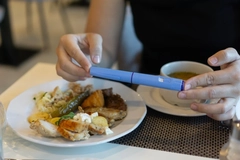
- Industry news
Industry news
- Category news
Category news
- Reports
- Key trends
- Multimedia
- Journal
- Events
- Suppliers
- Home
- Industry news
Industry news
- Category news
Category news
- Reports
- Key trends
- Multimedia
- Events
- Suppliers
Citrus under pressure: IFF VP on “turbocharging” innovation amid supply chain squeeze
Citrus price volatility has shaken the global food industry over the past three years, driven by a cascade of challenges such as climate extremes, disease outbreaks, and trade complexities. While these pressures continue to squeeze supply and inflate costs, they are also fueling a wave of innovation — from citrus oil alternatives to upcycled orange oils — reshaping how the industry adapts to disruption.
Constrained supply has increased frozen orange juice concentrate prices to record highs, while retail orange juice prices have nearly doubled from about U$2.30 in 2020 to around US$4.50 per 12‑oz bottle in early 2025, according to the Bureau of Labor Statistics.
Karel Coosemans, VP of Citrus Innovation, IFF, says prices have been falling since the start of the year from a peak in 2024, but they are still trending at high levels.
“Citrus crop yields and juice production volumes have been hit hard by a perfect storm of climate extremes, greening disease, and a lower consumer appetite for 100% juice,” he tells Food Ingredients First.
“This also resulted in a short essential oil supply while we saw skyrocketing consumer demand for citrus flavors. The knock-on effect has been soaring prices.”
Given the ongoing impact of climate change and with no viable solution for greening disease in sight, he says manufacturers have been seeking strategies to minimize costs and stabilize their supply chain.
“Many have been reducing the quantity of orange juice in their products, which can create taste challenges. We’re certainly seeing increased interest in our flavor technologies, which allow a reduction in orange juice levels while retaining full taste.”
 Amid climate stress and greening disease, manufacturers are seeking ways to cut costs and stabilize supply, says Coosemans.
Amid climate stress and greening disease, manufacturers are seeking ways to cut costs and stabilize supply, says Coosemans.
“Turbocharging” citrus solutions
The impact of plummeting citrus fruit production is visible worldwide, with citrus-producing regions reporting output declines. In the US, Florida orange production is down by nearly 10% in 2024-25, according to the USDA.
Additionally, trade barriers such as the US-Canada tariffs on orange juice further elevate price pressure. Canada’s retaliatory 25% tariff on Florida orange juice has significantly raised retail prices, impacting consumers and exporters in both countries.
Extreme temperatures have also affected the “citrus belt,” which includes key citrus producers like Spain, the US, and Brazil since 2023. The last El Niño event caused an 18% drop in production in Brazil’s citrus belt, according to a report by Fundecitrus, a research association in Brazil.
IFF is focusing on the Florida citrus belt to foster citrus innovations and mitigate the sector’s ongoing challenges. In April, the company opened a Citrus Innovation Center to work solely on citrus technologies, including flavor and aroma applications in F&B.
The site will help beverage manufacturers with “long-term, sustainable solutions to tackle citrus ingredient availability and price volatility,” says Coosemans.
“Based on Florida Polytechnic University’s campus in the heart of the state’s citrus belt, the center provides direct access to industry-leading experts, academia, and on-site prototyping capabilities, enabling customized solutions.”
The flavor firm aims to leverage its expertise in natural ingredients, processing, analytics, and product creation to accelerate product development, advanced product testing, and innovative co-creation at the facility.
“We will have the ability to innovate and create new specialities or concentrates or find new varietals of citrus. We’re confident it will turbo-charge solutions to the key problems currently facing the citrus industry.”
 Florida orange production is down by nearly 10% in 2024-25, according to the USDA.
Florida orange production is down by nearly 10% in 2024-25, according to the USDA.
Leveraging substitutes and upcycling
While there will always be a need to create citrus flavors entirely from citrus oils, Coosemans reveals that IFF has gradually expanded its portfolio to include oil extenders and zero-citrus creations.
“Citrus-inspired flavors that are entirely free of citrus-derived materials are a great way to overcome the obstacles facing the sector.”
The company has developed IFF CURE or Core and Uncommon Replacements and Extenders, to help manufacturers navigate the complex citrus landscape.
“It offers sustainable, citrus-identical flavor ingredients sourced from natural-alternative channels and bio-derived technology, helping manufacturers to manage fluctuations in citrus supply and price.”
The citrus solutions include extenders, raw materials that replace citrus oils while maintaining authentic citrus profiles and the taste of the original oil, and upcycled orange oils. “These are repurposed from fresh orange peels from retail juicing operations, reducing food waste, CO2 emissions, and costs,” he explains.
Coosemans also highlights IFF’s Flavorfit taste modulation toolbox that helps manufacturers adjust their recipes to enhance sweetness perception and bring back mouthfeel. Additionally, IFF texturants improve consistency without adding more juice.
“We also offer solutions for customers who need to keep a 100% juice claim, including support with associated regulatory issues.”
 IFF’s Florida Citrus Innovation Center will focus on advancing citrus technologies and rapid product development (Image credit: IFF).
IFF’s Florida Citrus Innovation Center will focus on advancing citrus technologies and rapid product development (Image credit: IFF).
Balancing innovation and sustainability
Coosemans adds that sustainability is a core focus in IFF’s citrus innovation strategy. Its Re-Master Citrus innovation program integrates IFF’s commitment to sustainability, aiming for all new citrus innovations to have a “sustainability value proposition.”
“We use the Innovation for Sustainability Assessment methodology to measure and track progress, ensuring solutions support both people and the planet. This includes responsible sourcing and a focus on the life cycle benefits of our citrus products.”
In the future, Coosemans believes citrus innovation will gather pace.
“We see enormous potential for innovation in citrus. For IFF, it’s not just about addressing the current supply and price issues — it’s about creating resilient solutions for delicious citrus flavors that meet the needs of the next generation.”



















